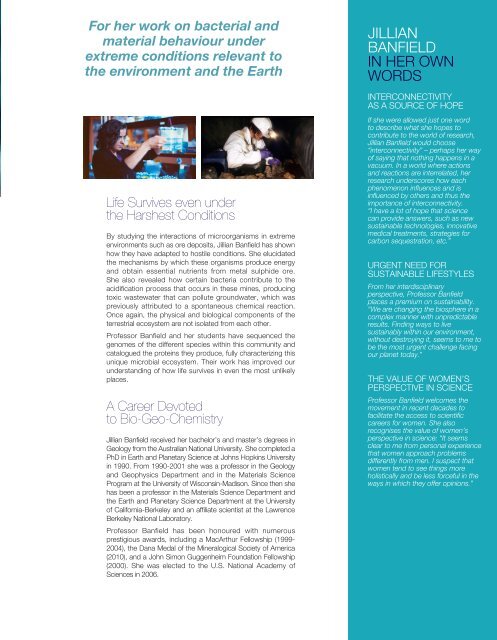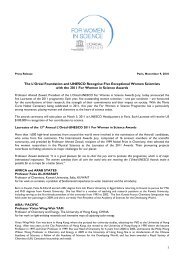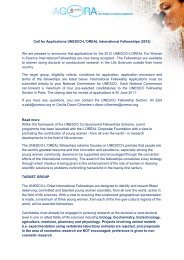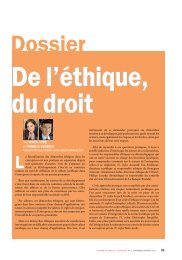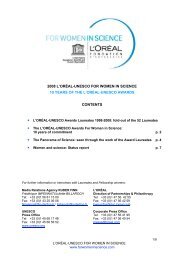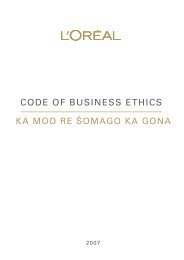2011 EDITION
2011 EDITION
2011 EDITION
Create successful ePaper yourself
Turn your PDF publications into a flip-book with our unique Google optimized e-Paper software.
For her work on bacterial and<br />
material behaviour under<br />
extreme conditions relevant to<br />
the environment and the Earth<br />
Life Survives even under<br />
the Harshest Conditions<br />
By studying the interactions of microorganisms in extreme<br />
environments such as ore deposits, Jillian Banfield has shown<br />
how they have adapted to hostile conditions. She elucidated<br />
the mechanisms by which these organisms produce energy<br />
and obtain essential nutrients from metal sulphide ore.<br />
She also revealed how certain bacteria contribute to the<br />
acidification process that occurs in these mines, producing<br />
toxic wastewater that can pollute groundwater, which was<br />
previously attributed to a spontaneous chemical reaction.<br />
Once again, the physical and biological components of the<br />
terrestrial ecosystem are not isolated from each other.<br />
Professor Banfield and her students have sequenced the<br />
genomes of the different species within this community and<br />
catalogued the proteins they produce, fully characterizing this<br />
unique microbial ecosystem. Their work has improved our<br />
understanding of how life survives in even the most unlikely<br />
places.<br />
A Career Devoted<br />
to Bio-Geo-Chemistry<br />
Jillian Banfield received her bachelor’s and master’s degrees in<br />
geology from the Australian National University. She completed a<br />
PhD in Earth and Planetary Science at Johns Hopkins University<br />
in 1990. From 1990-2001 she was a professor in the geology<br />
and geophysics Department and in the Materials Science<br />
Program at the University of Wisconsin-Madison. Since then she<br />
has been a professor in the Materials Science Department and<br />
the Earth and Planetary Science Department at the University<br />
of California-Berkeley and an affiliate scientist at the Lawrence<br />
Berkeley National Laboratory.<br />
Professor Banfield has been honoured with numerous<br />
prestigious awards, including a MacArthur Fellowship (1999-<br />
2004), the Dana Medal of the Mineralogical Society of America<br />
(2010), and a John Simon guggenheim Foundation Fellowship<br />
(2000). She was elected to the U.S. National Academy of<br />
Sciences in 2006.<br />
JILLIAN<br />
BANFIELD<br />
IN HER OWN<br />
WORDS<br />
INTERCONNECTIVITY<br />
AS A SOURCE OF HOPE<br />
If she were allowed just one word<br />
to describe what she hopes to<br />
contribute to the world of research,<br />
Jillian Banfield would choose<br />
“interconnectivity” – perhaps her way<br />
of saying that nothing happens in a<br />
vacuum. In a world where actions<br />
and reactions are interrelated, her<br />
research underscores how each<br />
phenomenon influences and is<br />
influenced by others and thus the<br />
importance of interconnectivity.<br />
“I have a lot of hope that science<br />
can provide answers, such as new<br />
sustainable technologies, innovative<br />
medical treatments, strategies for<br />
carbon sequestration, etc.”<br />
URgENT NEED FOR<br />
SUSTAINABLE LIFESTYLES<br />
From her interdisciplinary<br />
perspective, Professor Banfield<br />
places a premium on sustainability.<br />
“We are changing the biosphere in a<br />
complex manner with unpredictable<br />
results. Finding ways to live<br />
sustainably within our environment,<br />
without destroying it, seems to me to<br />
be the most urgent challenge facing<br />
our planet today.”<br />
THE VALUE OF WOMEN’S<br />
PERSPECTIVE IN SCIENCE<br />
Professor Banfield welcomes the<br />
movement in recent decades to<br />
facilitate the access to scientific<br />
careers for women. She also<br />
recognises the value of women’s<br />
perspective in science: “It seems<br />
clear to me from personal experience<br />
that women approach problems<br />
differently from men. I suspect that<br />
women tend to see things more<br />
holistically and be less forceful in the<br />
ways in which they offer opinions.”


